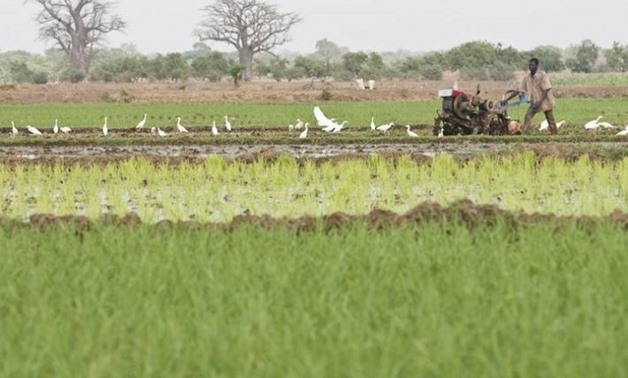
Agriculture is crucial to Africa’s development but needs increased mechanization to boost economic productivity, reduce harvest and post-harvest losses and meet growing demand for food. SOURCE: FAO
CAIRO – 4 December 2019: The Food and Agriculture Organization of the United Nations (FAO) launched today in Tunisia the Regional Conference on Improving Water Productivity in Agriculture in the Near East and North Africa (NENA) region.
This three-day conference is the first meeting of the “Collaborative Platform on Water Productivity” of the regional Initiative on Water Scarcity (IWS) for NENA. This conference is gathering researchers, young innovators and policy makers in a scientific arena to discuss the status of water productivity in the region, the challenges facing the agricultural sector and the available solutions.
The conference is also supported by the FAO regional project “Implementing the 2030 Agenda on Water Efficiency, Productivity and Sustainability in the Near East and North Africa,” funded by the Swedish International Development Cooperation Agency (SIDA).
The conference is allowing experts to debate on methods for Water Productivity (WP) improvement, and the role of WP in reinforcing agricultural sustainability, promoting economic development, maintaining social stability and protecting the environment in rural areas and cities.
In his inaugural speech, Philippe Ankers, FAO Sub-Regional Coordinator for North Africa, said that “projections show that the frequency of drought could increase by 20 to 60 percent before the end of the century, and that no other region was touched by desertification as much as the Near East and North Africa.”
He called for acting “quickly” to address “the triple burden of sustainable water management, climate change, and food security and nutrition.”
Mr. Ankers urged experts, decision-makers and young innovators to help transform the way we use water in the short-, mid- and long-term, hoping that the collaborative platform created by FAO can facilitate this process.
In preparation of the conference, FAO hosted a series of regional training sessions:
- From 28 November to 3 December, experts learned how to do soil salinity mapping.
- From 1 to 3 December, FAO offered a training on the WaPOR software application, which is dedicated to crop mapping using remote sensing.
- on December 3rd, training on water accounting was delivered to familiarize participants with general water accounting/auditing concepts and help them recognize the differences between consumptive vs. non-consumptive uses and beneficial and non-beneficial uses, and identify uncertainty to reduce water budget.
- On 2-3 December, a high-level meeting on the AquaCrop software was held with the aim of assessing the status of the application platform and the need for updating it, in addition to proposing a comprehensive approach for training, dissemination, and the development of new applications using AquaCrop in the future.
Youth Participation
The conference is also an opportunity to showcase innovative software solutions developed by young university students in Tunisia. The student software developers took part in a “Hackathon” launched on October 1st, 2019 at the Technopark of Manouba University during a seminar on “Smart Irrigation”. That event was attended by researchers, professionals, students and technology start-ups.
Eight student groups - around 40 students - from various universities are competing in the Hackathon and have been able to develop their ideas at the co-working space Al-Gazala Incubator Park of the Technopark. The results of their efforts will be evaluated by a special jury, including FAO experts, and the winners will be announced during the conference.
Marketplace
The conference will also play host to an innovation “marketplace”, an open space for sharing knowledge. The marketplace will be a physical space on the sidelines of the conference where the FAO collaborative platform on water productivity can be demonstrated.
It is also a space where farmers/practitioners can meet experts in an informal setting and all participants can share their knowledge, discuss the exhibited posters, tools, and contributions in a relaxed manner. The marketplace is organized around the themes of the conference.
This conference and associated projects are part of the Regional Initiative on Water Scarcity (IWS) launched by FAO in 2013 to support the countries of the NENA region to address two of their most urgent challenges: food security and water security for sustainable economic and social development in a context of water scarcity.


Comments
Leave a Comment